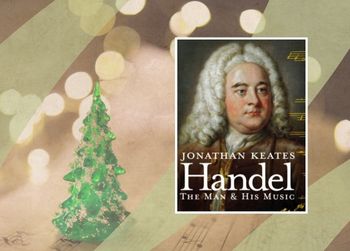Saturday 10 December sees the New Zealand Symphony Orchestra and Wellington’s Tudor Consort perform Handel’s Messiah. Although now a fixture of the Advent and Christmas seasons, Messiah was first performed 280 years ago on Good Friday, 13 April 1742, in Dublin. Conceived as a Lenten piece, the second part of the oratorio offers a meditation on the passion, death, and resurrection of Christ, before Part III’s message of redemption and victory over sin and death. However, Part I, with its Old Testament prophecies of the Messiah’s birth and the New Testament annunciation texts, is now firmly associated with Christmas.
Whether you’re attending Saturday’s performance, or if you make listening to Messiah an annual event at home, this is a great opportunity to explore some of the books about Handel’s life and music in our collection, alongside some CDs of Messiah.
Messiah : the composition and afterlife of Handel’s masterpiece / Keates, Jonathan
A detailed and authoritative study of the most frequently performed pieces of Western art music. Keates, a renowned biographer of Handel, explores the background of Messiah, the circumstances that led to its composition, the collaboration and conflicts between Handel and his librettist Charles Jennens, the social context of early performances, and how our understanding of spirituality in Messiah has changed between the eighteenth and twenty-first centuries.
Messiah Dublin, 1742 / Handel, George Frideric
The Edinburgh-based Dunedin Consort, presents a stylish and expressive Messiah, reconstructing the version and performing forces that would have been found at the oratorio’s first performance in Dublin on 13 April 1742. The Dublin version of Messiah contains some music that is only rarely heard in performances today, offering a new perspective on Handel’s original conception of the oratorio.
Handel : the man and his music / Keates, Jonathan
This is a revised and updated version of Jonathan Keates’s ‘masterful’ biography of Handel that first appeared in 1985; the new edition reflects new research into Handel’s life and music that occurred in the 1990s and early 2000s. The result is a scholarly yet readable account of Handel’s life, set out alongside commentary on his works. Keates’ use of correspondence and other primary sources also helps to bring alive the world in which Handel lived, whether in Germany, Italy, or London.
Handel, who knew what he liked / Anderson, M. T
This humorous yet detailed biography of Handel is accessible and informative for children and enjoyable for adults as well. The author skillfully weaves together memorable incidents in Handel’s life to illustrate how the composer overcame difficulties in his childhood, and obstacles in his later professional life to realise his ambition and practice his art. M.T. Anderson and Kevin Hawkes make this book a witty and accessible introduction to Handel and the eighteenth century.
The Cambridge Companion to Handel
The collection of essays in the Cambridge Companion to Handel provides a fascinating guide to the life and work of the composer, as well as the social context in which he lived and worked. The chapters on Handel’s sacred music and oratorios explore how Handel’s own faith and theology shaped and reflected the music he wrote. Donald Burrowes also discusses the performances of Handel’s oratorios during his lifetime, offering a tantalizing glimpse of the sometimes-chaotic premieres and revivals of Handel’s music.
Handel in London : a genius and his craft / Glover, Jane
Conductor and scholar Jane Glover charts the growth of Handel’s career in London, the city where he made his home. Glover’s very readable text examines Handel’s composing life, the challenges, rivalries, and feuds of the music business, and Handel’s interactions with other composers, singers, the nobility, and the public. Glover’s understanding of, and love for Handel’s music reverberate throughout the book.
Messiah / Handel, George Frideric
Emmanuelle Haïm directs the choir and orchestra of Le Concert d’Astrée and four outstanding soloists in this 2014 recording of Messiah. Haïm’s interpretation provides diverting contrasts to the approach taken by John Butt and the Dunedin Consort. The musicians of Le Concert d’Astrée’s orchestra play impeccably, and Haïm emphasises the dramatic, almost theatrical elements of Handel’s score. The vocal soloists are outstanding, delivering eloquent accounts of the most expressive moments throughout the oratorio.


